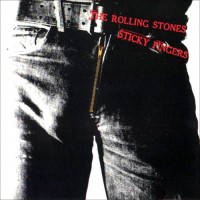
The first album released by the Stones in the 1970s, it’s an album drenched in a sheen of perspiration. Many of the tracks were conceived in the late 60s (Wild Horses, Brown Sugar) and as such, would fit right in on the previous Stones’ album, Let It Bleed. While that album oozed menace, this album seems to be mired in a drug-induced haze. Known for its hits, the real gems are hidden like a junkie’s last healthy vein.
The album kicks off with Brown Sugar, a song about interracial sex and cheap dope. A classic, it captures the initial surge of energy that propels the Stones into the 70s. Bobby Keys’s sax adds an extra touch of raunchy sex appeal. “Sway” is a yearning tune full of resignation to an inevitable descent into depression. “Wild Horses” is cut from the same thematic cloth though it is far more famous. “Can’t You Hear Me Knocking” is a seven minute-plus song, a showcase for MIck Taylor’s virtuoso guitar. Keith Richards has stated that Ron Wood is his favorite co-guitarist but Taylor is the better musician. The majority of the song is a jam between dueling guitars, two brothers of diverse personalities trying to outdo each other in front of the audience. “You Gotta Move” is a nod to the blues masters the Stones revered (and from whom they pinched a tune or two… or three… or…). “Bitch” opens Side B. It’s pace is quicker than Brown Sugar but while a good tune it lacks that extra bit of edge and bite that the album opener has. “I Got the Blues” is a retreat back into that dark cave of weariness. The lyrics express hope that one’s former flame is now happy but Jagger’s voice betrays this as a lie; he misses her and what he would do do have her back. “Sister Morphine” is the bottom of the drug induced state; the singer’s waiting for Death. “Dead Flowers” is the hidden jewel of this album. The lyrics reveal shame, an attempt to run from the light that would reveal the singer’s addiction. Hidden from daylight, from prying eyes of the upper crust of society, one can indulge in that blissful euphoria that the drug of choice provides. There’s a promise that the singer will outlive others and will be sure to be at their graves long after they’re gone. As melancholy as “Moonlight MIle” is, there’s a glimmer of hope in it. The lyrics indicate an partial emergence from the haze and at least offer the possibility that things will be better, if not then, than someday.
This is the Stones album you play when you’re hanging on your back porch with your one or two friends or your lover, a beer or a glass of wine in your hand; the one you play as you drive down dark lonely roads as you travel through middle America; the one makes your pause and think about that girl that got away when you hear it in a pub on Thursday evening. It’s the one that lets you know that you’ve crawled through a mile of sewage and came out on the other side; dirty, sweaty, smelly, scarred. But alive. —Neunzehn


